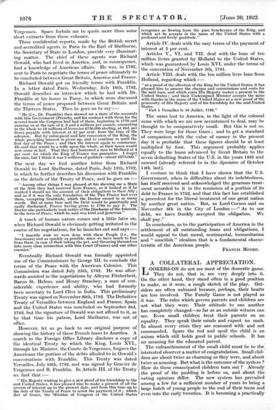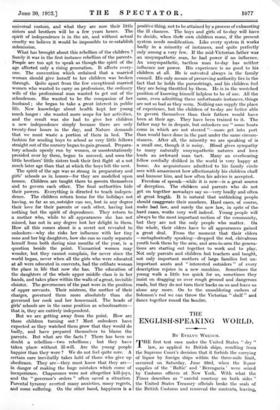A COLLATERAL APPRECIATION.
LOOKERS-ON do not see most of the domestic game. They do not, that is, see very deeply into it. On the other hand, they stand often in a good position to make, as it were, a rough sketch of the play. Out- siders are often unbiased because, perhaps, their hearts are less involved. The Family Game is not played as it was. The rules which govern parents and children are not what they were. Their attitude to one another has completely changed—so far as an outside witness can see. Even small childrgn treat their parents on an equality. They speak their minds and expect no snub. In almost every crisis they are reasoned with and not commanded. Spare the rod and spoil the child is an axiom which still holds good in public schools. It has no meaning for the educated parent.
The enfranchisement of the small child must be to the interested observer a matter of congratulation. Small chil-. circa are about twice as charming as they were, and about twice as amusing. But what is the outcome of the system ? How do these emancipated children turn out ? Already the proof of the puddling is before us, and about the eating opinions differ. The new system has prevailed among a few for a sufficient number of years to bring a large batch of young people to the end of their teens and even into the early twenties. It is becoming a practically universal custom, and what they are now. their little sisters and brothers will be a few years hence. The spirit of independence is in the air, and without actual cruelty we believe it would be impossible to re-establish sUbmission. • What has brought about this rebellion of the children ? Surely it was in the first instance rebellion of the parents. People are too apt to speak as though-the spirit of the age affected only a rising generation. It affects every- one. The convention which ordained that a married woman should give herself to her children was broken through. Quite apart from the few exceptional married women who wanted to carry on professions, the ordinary wife of the professional man wanted to get out of the schoolroom. She wanted to be the companion of her husband ; she began to take a great interest in public life. New knowledge about health kept her young much longer : she wanted more scope for her activities, and the result was she had to give her children a new independence simply because there are only twenty-four hours in the day, and Nature demands that we must waste a portion of them in bed. The fashion for sending boys to school as very little fellows straight out of the nursery began to gain ground. Prepara- tory schools openly run by women, or unostentatiously presided over by them, began to succeed, and soon the little brothers' little sisters took their first flight at a not much later age than that at which the boys left the nest.
The spirit of the age was as strong in preparatory and girls' schools as in homes—for they are modelled upon homes. Children are taught there to govern themselves and to govern each other. The final authorities hide their powers. Everything is directed to teach indepen- dence. The children return home for the holidays not. having, so far as an,.outsiOer can see, lost in any degree their love for, their parents or each other, having lost nothing but the spirit of dependence. They return to a mother who, while to all appearances she has not missed, has not in any degree lost her delight in them. How all this comes about is a secret not revealed to onlookers—why she risks her influence with her tiny sons and her big daughters, how she can so easily separate herself from both during nine months of the year, is a question beside the point. Unmarried women may wonder, but they cannot complain, for never since the world began, never when all the girls who were educated at all were educated in convents, had the celibate woman the place in life that now she has. The education of the daughters of the whole upper middle class is in her hands, and takes place within the walls of a great; invisible cloister. The governesses of the past were in the position of upper servants. Their mistress, the mother of their charges, governed them more absolutely than she governed her cook and her housemaid. The heads of girls' school's 'are in the same position as schoolmasters— that is, they are entirely independent.
But we are getting away from the point. How are these children turning out ? Most onlookers have expected as they watched them grow that they would do badly, and have prepared themselves to blame the parents. But what are the facts ? There has been no doubt a rebellion—two rebellions ; but they have taken 'place- without ill-will. Are the young people happier than they were ? We do not feel quite sure. A certain care inevitably takes hold of those who give up obedience. They are—they must know that they are— in danger of making the huge mistakes which come of inexperience. Chaperones were not altogether kill-joys, and the " governor's orders " often saved a situation. Parental tyranny averted many anxieties, many regrets, and some suffering. On the other hand, happiness is a positive thing, not to be attained by a process of exhausting the ill chances. The boys and girls of to-day will hive to decide, when their owfi children come, if the present system needs modification. Like every system it works badly in a minority of instances, and quite perfectly only among a very few. If the mid-Victorian father was an unsympathetic. man, he had power if no influence. An unsympathetic, tactless man to-day has neither influence nor power. His experience is no good to his children at all. He is outvoted always in the family council. His only means of preserving authority lies in the fact that he holds the pursestrings, and his children feel . they are being throttled by them. He is in the wretched position of knowing himself helpless to be of use. All the same, even admitting these unfortunate instances, things are not so bad as they seem. Nothing can supply the place of experience, but the children of to-day are better able to govern themselves than their fathers would have been at their age. They have been trained to it. The father may be in despair, but onlookers see " some boats come in which are not steered "—more get into port than would have done in the past under the same circum- stances. After all, the minority we are speaking of is a small one, though it is noisy. Blood gives sympathy to many naturally unsympathetic natures and love lends an awkward• man tact. Many an overbearing fellow cordially disliked in the world is very happy at home. An acquaintance admitted to his family circle sees with amazement how affectionately his children chaff and humour him, and how often his advice is accepted.
Freedom of speech—while it is new—is a great source of deception. The children and parents who do not get on together nowadays say so—very loudly and often at great length. It is natural that unthinking people should exaggerate their numbers. Hard cases, of course, , make bad law, and surely the new law, in spite of .the hard cases, works very well indeed. Young people will always be the most important section of the community, but they are not the only people who matter. On the whole, their elders have to all appearances gained a great deal. From the moment that their elders —metaphorically speaking—dropped the rod, chivalrous youth took them by the arm, and arm-in-arm the genera- tions are starting out together to work and to play. Not only parents and children but teachers and taught, not only important mothers of large families but un- important aunts and " interested outsiders " of every description rejoice in a new sunshine. Sometimes the young walk a little too quick for us, sometimes they insist on dragging us over rough ground and dangerous roads, but they do not turn their backs on us and leave us alone any more. On to the smouldering embers of Solomon's rod we can throw the Victorian " shelf " and dance together round the -bonfire. '











































 Previous page
Previous page